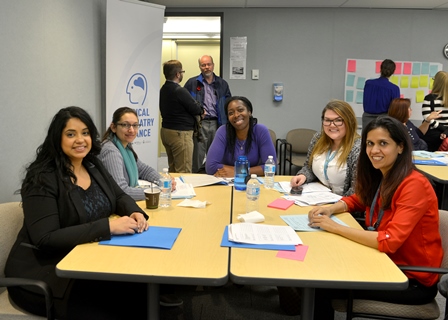In Ontario, over 1.3 million people experience mental illness and physical illness at the same time, and there is increasing evidence suggesting the need to integrate care for mental and physical health conditions, as they can often be interrelated. Health care providers often see patients in their daily practice who have increasingly complex co-existing mental and physical health care needs, but do not always have the most effective tools or training to best support them.
Although there has been a growing focus to improve education for health care providers in this area, there remains a significant need for capacity building for frontline health care providers, including primary care and hospital teams, to improve care at this critical interface of mental and physical health.
In order to better bridge the current education gap, Trillium Health Partners is offering a new continuing education program: the Medical Psychiatry Collaborative Care Certificate (MP3C). Initially launched in the Mississauga community, the program is being designed to equip health care providers from all disciplines with the tools and resources to better integrate mental and physical health care with their patients. The Medical Psychiatry Collaborative Care Certificate is supported by the Medical Psychiatry Alliance (MPA), a collaborative partnership between Trillium Health Partners, The Centre for Addiction and Mental Health (CAMH), The Hospital for Sick Children (SickKids), and the University of Toronto. The MPA is dedicated to transforming care for Ontarians living with co-existing mental and physical health conditions.
“The focus of our program is to ensure the right education and training tools are available to health care providers to treat the mind and body together. We need to help patients and their families to recover from both mental and physical illnesses with one plan of care and a unified approach,” says Dr. Alison Freeland, Vice President, Quality, Education and Patient Relations, Trillium Health Partners.
In its initial phase, the Medical Psychiatry Collaborative Care Certificate includes three modules:
Additional modules are planned in 2017 that will include focusing on quality improvement and best practices in team based, integrated care environments, along with skills and tools to facilitate and improve caring for patients with specific co-occurring mental and physical health needs.
Teachers consist of a variety of experienced health care providers and community members, including Nurse Practitioners, Psychiatrists, Social Workers, Education Specialists, Family Physicians, as well as patients and family members who bring their perspectives and experience to the learners.
“The goal of the Medical Psychiatry Collaborative Care Certificate is to provide training that will help health care providers care for patients who too often fall through the cracks of a health care system where mental and physical health care is typically addressed separately, rather than together. What is remarkable about this training is the alignment of quality improvement, interprofessional education, and inclusion of patients as partners, helping participants implement more integrated mental and physical health care in their own practices,” says Dr. Sanjeev Sockalingam, Director of Curriculum Renewal, Medical Psychiatry Alliance, and Director of Continuing Practice and Professional Development, University of Toronto.
Andrea Lamarre, a former Trillium Health Partners’ patient whose own experience with the health care system has prompted her to do further research on patient experience in her professional life, has signed up as a co-teacher for the Patients and Families as Partners in Integrated Collaborative Care module of the Medical Psychiatry Collaborative Care Certificate. “Part of my teaching includes reminding health care providers that being aware of how you as a person can impact care delivery for patients who are often vulnerable and may have experienced trauma in their lives – this helps put a human face on their diagnosis. What’s most groundbreaking about this education program for me is how my perspective as a patient was valued as equal to that of any other expert involved in the training,” she says.
Since launching in September of 2016, the Medical Psychiatry Collaborative Care Certificate program had over 250 registrations and it keeps growing. In these early stages, participants are encouraged to contribute to the development and refinement of course offerings. As this work progresses, the program will be continuing consultations with current and future participants to understand the education gaps and requirements for integrated collaborative care across Ontario, with the hope of broadening the offering to more communities around the province. For more information, please visit www.medpsychalliance.ca .




